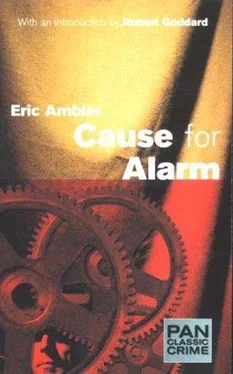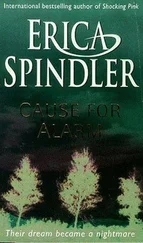Eric Ambler - Cause for Alarm
Здесь есть возможность читать онлайн «Eric Ambler - Cause for Alarm» весь текст электронной книги совершенно бесплатно (целиком полную версию без сокращений). В некоторых случаях можно слушать аудио, скачать через торрент в формате fb2 и присутствует краткое содержание. Жанр: Криминальный детектив, на английском языке. Описание произведения, (предисловие) а так же отзывы посетителей доступны на портале библиотеки ЛибКат.
- Название:Cause for Alarm
- Автор:
- Жанр:
- Год:неизвестен
- ISBN:нет данных
- Рейтинг книги:3 / 5. Голосов: 1
-
Избранное:Добавить в избранное
- Отзывы:
-
Ваша оценка:
- 60
- 1
- 2
- 3
- 4
- 5
Cause for Alarm: краткое содержание, описание и аннотация
Предлагаем к чтению аннотацию, описание, краткое содержание или предисловие (зависит от того, что написал сам автор книги «Cause for Alarm»). Если вы не нашли необходимую информацию о книге — напишите в комментариях, мы постараемся отыскать её.
Cause for Alarm — читать онлайн бесплатно полную книгу (весь текст) целиком
Ниже представлен текст книги, разбитый по страницам. Система сохранения места последней прочитанной страницы, позволяет с удобством читать онлайн бесплатно книгу «Cause for Alarm», без необходимости каждый раз заново искать на чём Вы остановились. Поставьте закладку, и сможете в любой момент перейти на страницу, на которой закончили чтение.
Интервал:
Закладка:
I decided on action. I walked on rapidly until I came to a fairly quiet side street. On the corner I hesitated as though I were uncertain as to my whereabouts, then turned down the side street. A few yards along it I stopped and moved into the darkened entrance to a shop. A second or two later I heard the footsteps of the man behind me approaching. He was almost level with the shop when I stepped out and stood in the middle of the pavement. Facing me and looking as though he would have given anything to be able to turn tail and run, was Bellinetti.
He made a gallant effort to carry off the situation.
“I thought I recognised you, Signore, but I could not be sure. I was alone. I thought that we might drink a cognac together.”
“With pleasure.” We began to walk back to the main road. “Do you often walk in the Gardens at night, Bellinetti?”
“On fine evenings, yes. You walk very fast, Signore.”
There was a note almost of insolence in his voice. He had clearly recovered his composure. I took up the challenge.
“Then, Bellinetti, I advise you not to try to keep up with me. Who knows what may happen to a man in your state of health.”
“My state of health, Signore?”
“You might be seriously injured at any moment,” I said blandly.
He frowned. “I am always very careful, Signor.”
“I am glad to hear it.” We were passing a caffe. “Shall we have our drink here?”
Ten minutes later I resumed my walk back to the hotel. It would, I decided, be a distinct relief to be rid of signor Bellinetti. It was bad enough to have an inefficient assistant. An inefficient assistant who supplemented his office work by spying upon one’s movements outside the office was intolerable.
There were two letters waiting for me when I got back to the hotel.
One was from my bank in London and concerned facilities for my drawing on their Milan agents. It was unimportant except for one thing. It was from England, and it had not been steamed open. Claire’s postscript had evidently been taken to heart by the unknown censor.
The other letter had been posted in Milan that afternoon. The envelope contained a small slip of paper with a single sentence typed on it:
ETHICALLY SPEAKING, YOU OWE ME A CAKE OF SOAP!
— that was all. There was no signature.
6
At half-past eight the following evening, I presented myself at the Opera House.
Madame Vagas’ greeting was, I thought, a trifle cold.
She was a thin, imposing woman with greying black hair, small haggard eyes and an air of fighting off an almost overpowering lassitude. There was a hint of strain at the corners of her mouth, and the movements of her hands were sudden and awkward, as though she were consciously directing their activities.
It was in the ante-room of his box that the General introduced me to her. “My wife, Mr. Marlow,” he said. I had bowed and now we stood looking at one another while a waiter spread caviar and opened a bottle of Asti Spumante.
She examined me for a moment or two. Then: “Are you sympathetic to the ballet, signor Marlow?”
She spoke a thick, guttural Italian. The words seemed to be forced from her lips. I was irresistibly reminded of the involuntary grunt of a person hit in the solar plexus.
The General replied for me.
“Signor Marlow is a devotee, Elsa, my dear. Otherwise I should not have asked him to join us here.” His tone was smooth enough, but I thought he smiled at her a little malignantly. In the subdued yellow light of the ante-room, his make-up was less obtrusive than when I had first seen him; but the points of his dress collar, where they touched the neck, were already smeared with grease and sun-tan powder. He transferred the smile to me. “How are you finding Milan, signor Marlow?”
“I can’t say that I’ve seen anything of it, General. I’ve been away in Genoa for the last few days. I only returned yesterday.”
“So? A glass of champagne?”
“Thank you.”
“You must have found Genoa very dull.” He turned to his wife. “Elsa, my dear, you remember that we found Genoa unspeakable?”
She took her glass of Asti. “That is the place with the large cemetery, isn’t it, signor Marlow?” Her eyes surveyed me. I had a feeling that my tie must be crooked. It was with difficulty that I prevented myself from fingering it.
“I was told so. The Genoese seem very proud of their cemetery.”
Vagas laughed politely. “I don’t suppose signor Marlow had much time for cemeteries. Let me see,” he added, “poor Ferning used to mention the Grigori-Sforza works at Genoa. I suppose, by any chance, you…?”
“Yes, it was the Grigori-Sforza works that I visited.”
He turned suddenly and spoke to Madame Vagas in a language that sounded like German. “I must apologise,” he went on to me; “I was just explaining to my wife that you are Mr. Ferning’s successor.” He put his glass down. “I think the overture is nearly finished. Shall we go in?”
The first ballet was Lac des Cygnes. From where I sat Vagas’ head was sharply outlined against the glare of the stage. Almost against my will my eyes kept wandering from the tremulous flutterings of the corps de ballet to watch his face. With the rise of the curtain his expression had changed. His lips had parted slightly, and he was breathing slowly and deeply. Every now and again he would swallow and clear his throat. It was like watching a man asleep. There was about him the same quality of unawareness, of preoccupation with dreams. Beyond him, in the shadows, I could see Madame Vagas, her face a smudge of grey against the curtains of the box, her body motionless. I looked down into the house upon the rows of white, still faces. It was as if they belonged to the dead, and only the figures on the stage were alive. A green light flickered in the wings and the Prince staggered back miming dread and horror, his body taut, his ridiculous crossbow jerking with the staccato movements of his arms. I saw the General raise a handkerchief and dab his lips. Madame Vagas yawned. The faces below did not move. The ballet approached its climax. At last the curtain fell. There was a roar of applause. The curtain rose, fell, rose again. More bows. Bouquets were carried on to the stage. The Prince kissed his hands to the Swan. The conductor took a bow. The curtain fell. The applause died away into a hum of conversation as the house lights went up.
The General sighed and put his monocle back in his eye.
“There is only one Fokine,” he said. “Did it please you, Mr. Marlow?”
“Very much.”
“The best is yet to come. Shall we smoke. Are you coming, Elsa, my dear?”
She shook her head slowly. “I think that the Contessa Perugia is on her way here.”
He frowned. “Please make my excuses to the lady. I think we might walk round to the cigar stall, Mr. Marlow.”
We made our way to the top of the main staircase. The place was packed. I could hear German, French and Spanish being spoken in my immediate vicinity. I could see a Hindu, a Chinese, two Japanese and a grey-faced man wearing a tarboosh.
“You see, Mr. Marlow,” murmured the General in my ear, “at La Scala, ballet recognises no frontiers.” He inclined his head gracefully but repressively to a man with a pointed white beard who seemed about to accost us, and led the way to the cigar stall.
“That man,” he explained, “is a member of a drug syndicate. Very charming, but his confidences are apt to be embarrassing. A match, Mr. Marlow?”
But I was no longer paying any attention to him. Weaving their way towards us through the crowd were a man and a woman. I gaped at them. The woman was young, almost a girl, and she was beautiful. It was a curious, nearly masculine beauty. The cheek-bones were high and drew the flesh smoothly away from the red lips in a way which gave her an oddly impassive expression. Her hair gleamed a very dark brown. Her hands were exquisite. Yet it was not so much she who had attracted my attention as the fact that beside her, his hand on her elbow and looking in his evening clothes more like a prize-fighter than ever, was Zaleshoff.
Читать дальшеИнтервал:
Закладка:
Похожие книги на «Cause for Alarm»
Представляем Вашему вниманию похожие книги на «Cause for Alarm» списком для выбора. Мы отобрали схожую по названию и смыслу литературу в надежде предоставить читателям больше вариантов отыскать новые, интересные, ещё непрочитанные произведения.
Обсуждение, отзывы о книге «Cause for Alarm» и просто собственные мнения читателей. Оставьте ваши комментарии, напишите, что Вы думаете о произведении, его смысле или главных героях. Укажите что конкретно понравилось, а что нет, и почему Вы так считаете.












